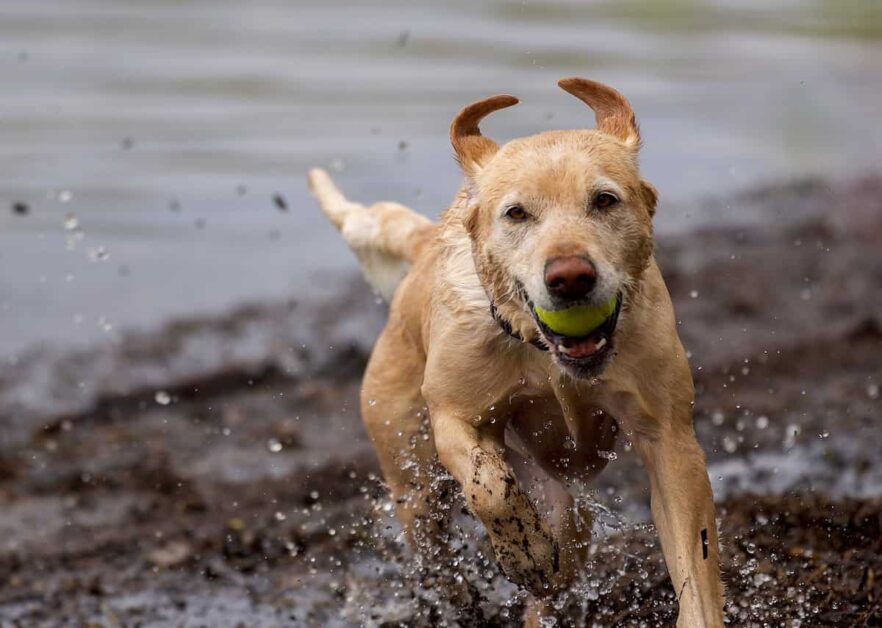Dogs have a natural instinct to dig for purposes like creating beds or hiding food. On carpets, they can more easily scratch and tear at the soft fabric. The texture feels good on their paws and claws. Also, carpet retains scents, so dogs may try to get to intriguing smells underneath. Overall, carpet allows satisfying digging without hitting the hard ground, so dogs are drawn to satisfy their instincts there.So let’s understand “Why Do Dogs Dig On Carpet” in details.

6 Reasons Why Dogs Dig on Carpet
“Different factors may trigger your dog’s digging behavior on carpet, including their DNA and instinctual behaviors. Some dogs dig out of sheer boredom or to seek attention from you.
They might be smelling something intriguing beneath the carpet fibers, seeking comfort in the rhythmic motion of digging, or experiencing anxiety that triggers this displacement behavior.”.
DNA
Dogs dig on carpets due to their DNA. They share a close link with wolves from the past. Tests show that all dogs come from a type of wolf. But, it’s not the gray wolf we think of today.
Those old habits are still part of them now. This is why some breeds dig more than others do. It’s in their genes to act like their wolf kin did long ago.
Boredom
Boredom can drive dogs to scratch or dig on the carpet. It’s their way of doing something when there’s not much going on. They have lots of built-in energy that needs to be put to use.
So, if a dog feels bored and has no toys or fun activities, it might start digging at the carpet.
This restless behavior is quite frequent in dogs lacking games or walks. Their body craves action and movement for an energy release. This can cause them to act out by tearing up your comfy rug! Boredom becomes a big fat reason as it stirs up frustration and leads them into destructive barking, chewing, or other actions like digging carpets.
Attention Seeking
Dogs love to be the center of your world. Sometimes, they dig on the carpet to grab your notice. This is one form of attention-seeking behavior in dogs. If you see your pup digging a lot, he might want more time with you.
It’s not bad for them to ask for care this way. But if it hurts your carpet, you will have to find another way for him to communicate his needs. Try playing games or going out for walks more often with him.
That might help stop his digging habit on the carpet.
Smelling Something Interesting
Dogs use their noses all the time. A dog’s nose is more powerful than a human’s! That means your dog can smell things you can’t. If there is an odd scent on the carpet, your dog might try to dig it up.
Maybe food fell there once or someone new walked across the rug. The smell could be interesting to them. This digging is just part of how dogs sniff and explore using their strong sense of smell.
Seeking Comfort
Dogs like to be comfy, just like us. They may dig on the carpet to create a cozy spot for rest. This is called nesting behavior. To make their bed feel ‘just right’, dogs scratch and move around before lying down.
But it’s not all about comfort! Some dogs hide toys or food in the dug-out spots for later use. It’s no different from kids hiding their favorite toys under their beds! Watch out, though – if your dog begins digging more than usual, they might be feeling anxious or bored.
Keep your pet happy with playtime and care to help lower these feelings.
Anxiety
Dogs may dig on carpet because they have anxiety. This is called a displacement behavior. They might be upset or nervous, and digging helps them feel better. Sometimes, dogs can feel this way when they are alone.
This is known as separation anxiety.
The stress of being apart from their owner makes some dogs anxious. To ease their worry, these pets may start to scratch or dig at the carpet. It’s like how some people bite their nails when they are worried! Dogs do this to try and cope with the fear that comes when they’re left all alone.
Sudden Increase In Digging Behavior
If you notice a spike in your dog’s carpet digging activity, it could be a sign of underlying medical conditions, increasing levels of boredom or anxiety, or responses to changes in their routine or environment.
Possible medical issues
Some dogs dig on carpets because of health issues. A dog might feel an itch or pain and try to scratch it away by digging. Thyroid disorders can also make a dog act this way. If the digging is new, seeing a vet is a good idea.
The vet can check if your pet has any health problems. They may find skin issues, pests like fleas, or other problems causing the digging.
Boredom or anxiety
Dogs often dig on carpets for many reasons. One big cause is boredom. Dogs want to play and have fun. If they don’t get enough fun, they might find ways to make their own, like digging into the carpet.
Another reason dogs dig is because of anxiety. Anxiety in dogs can lead to restless and destructive actions such as carpet digging. This action helps them deal with stress or fear by doing something familiar and physical like digging.
Some breeds, like Huskies and Malamutes, do this more due to their cool-loving nature.
Changes in routine or environment
Dogs love routines. They like when things stay the same. Changes in their world can make them feel upset or scared. This might make your dog start to dig on the carpet. Moving to a new home is a big change for a dog.
Getting new furniture, or even moving old furniture around, can also upset them.
New smells in the room could come from unseen objects lying around. Your dog may try to find these by digging on the carpet! Also, if you are not at home as much as usual, your dog might get bored and dig out of sheer boredom.

How to Stop Dogs from Digging on Carpet?
Addressing the underlying causes of your dog’s digging, like anxiety or boredom, is key to stopping this behavior. Strategies such as providing alternative outlets for digging, increasing mental stimulation and exercise, and employing training techniques can be very effective.
Address underlying issues
Look at the main cause when your dog digs on the carpet. Does your pet feel too hot or too cold? Maybe they are trying to fix this issue. Your dog might also dig for other reasons, like hiding toys and food.
Some dogs even react to scents by digging. It’s very important to find out why they do it so that you can help them in a good way with proper training, exercise, and mental fun. Fixing these issues can also stop destructive behavior and help lower excessive energy levels.
Provide alternative outlets for digging
It’s good to offer dogs other spots for digging. You can help your dog by making a safe place outdoors. Use sand or loose dirt in this area. Dogs also love playing with digging toys and puzzles.
They are great indoor activities that keep dogs busy, curb their dig desire, and protect the carpet at home. The cooling vests and mats are helpful too when it gets hot outside! These useful items make dogs feel cool while reducing their need to dig on the carpet for comfort.
All these can meet our furry friends’ needs in different ways so they don’t have to scratch the floor anymore.
Increase exercise and mental stimulation
Being active is good for dogs. It helps stop bad acts like digging on carpets. A fun game of fetch can lessen their wish to dig. Long walks let pups explore and use up energy. These are ways to give your dog more exercise.
Playing with toys also keeps a dog’s mind busy. Puzzle toys make dogs think hard to get treats out from them. This gives mental stimulation and stops boredom. Both these things lower the chance for bad behavior like carpet digging.
Training and redirection techniques
Training your dog can stop them from digging the carpet. Use basic obedience commands like “No” or “Stop”. Be stern but not mean. When your dog starts to dig, tell them “No” and move them away from the carpet.
Then, give them something else to do. This is called redirecting attention. It’s good to have chew toys nearby for this purpose. Positive reinforcement works well too! If your dog listens and stops digging, reward them with a treat or a pat on the head.
Keep doing this and soon enough they will know that digging on the carpet is off-limits.
Is Scratching the Floor Normal for Dogs?
Scratching the floor is normal behavior for dogs due to their instinctual need to dig, but continuous and severe digging could pose potential harm to both your pet and your carpet.
Instinctual behavior
Dogs love to paw at the ground. This is a part of their natural behavior. They also scratch or dig on carpets for many reasons. One big reason is to make a nest-like area for resting.
Their genes tell them to do this as it was done by their wild ancestors long ago. Some dog breeds do it more than others because it’s in their nature more strongly. These actions are not strange, but simply show that your dog is following its instinctive pattern of actions.
Potential negative consequences of unchecked digging
Unchecked digging can harm your carpet. It makes the floor look bad with tears and frays. Dogs may also find things in the carpet that are harmful to them. This could be small objects or smells that they shouldn’t eat or lick.
If a dog does this all the time, it can make messes bigger and worse over time.
Many dogs dig because of their DNA, but it can become a big problem if left alone for too long. It’s best to stop this behavior as soon as you see it happen to keep your home and your pet safe from damage or harm.
Possible Solutions for Dogs Scratching the Floor
Creating a designated digging spot in your yard, regularly trimming your dog’s nails, and thoroughly cleaning their paws after outdoor activities can help mitigate the issue of dogs scratching the floor.
Providing a designated digging area
You can stop dogs from digging the carpet by giving them a special area to dig. This spot lets your dog meet its need to dig without hurting your floors. It helps satisfy their born instinct for digging like wolves do when they want a nice place to rest, hide food or mark their spots.
Dogs might scratch the floor because there are objects or smells that get them excited. A spot just for digging is good for bored dogs and those with separation anxiety. The area will also be perfect if you notice that your dog likes to bury toys in secret places!
Keeping nails trimmed
Keeping your dog’s nails short is a good idea. Nail care helps stop them from scratching the floor. Overgrown nails can cause problems for dogs and hurt their feet. Cutting their nails often keeps them at a safe length.
But, take care when trimming not to cut into the “quick”. This part of the nail has blood flow and cutting it will hurt your pet. If you are unsure how to trim or fear hurting your dog, get help from a vet or groomer.
For extra protection, think about using nail caps or booties on their paws.
Cleaning paws after outdoor activities
Outdoor activities can make your dog’s paws dirty. Dirt and debris from the outdoors can stick to their paws. This dirt may scratch or damage the floor when they come inside.
Cleaning your dog’s paws after outdoor play is a smart move. It helps keep bacteria and germs out of your home. You can use a special mat for paw cleaning. This will help guard against floor scratching at home.
Also, be sure to clean your pet’s paws on a regular basis. Regular cleaning keeps the living area clean and hygienic.

Common Myths About Dogs Digging on Carpet
Many people believe common myths about dogs digging on carpet such as “they’re trying to bury something” or “they’re trying to escape”. In this section, we will debunk these misconceptions and provide insights into the real reasons behind your canine companion’s behavior.
“They’re trying to bury something”
Dogs dig on carpets because of their deep-rooted instincts. Long ago, wild dogs had to hide food from other animals. They dug holes in the ground and covered it up with dirt. Today’s pets still do this, but they use carpets instead of dirt.
This is called burying behavior. It might seem strange for us, but it makes perfect sense for them!
“They’re trying to escape”
Many people believe dogs dig on carpets to run away. This is a myth. Dogs do not dig to escape their home. They feel safe and happy there. Beware of this common misconception about dogs digging.
It helps in understanding dog behavior better. Thus, we can find the right solution for dogs scratching the floor and manage their indoor activities wisely.
Dealing with Specific Reasons for Digging on Carpet
Understanding the specific reasons why dogs dig on carpet, such as hiding food or controlling temperature, can be crucial in managing this behavior. Delve deeper into these causes and explore ways to manage them effectively by reading further.
Hiding food or toys
Dogs often dig on the carpet to hide things. This comes from their wild past. In nature, they hide food or toys to protect them from other animals. This is called canine behavior.
They might scratch the carpet and then drop a toy or piece of food there, pretend to bury it with their noses, and then leave it alone. To fix this, you can create a spot for your pet where digging is okay like a sandbox in your yard.
Put some toys in there so they get used to finding things in that spot and not on your carpet! This way, this fun dog training game can also help prevent damage to your home’s floors.
Temperature control
Dogs can feel too hot or too cold just like us. Your dog might start to dig on the carpet for temperature control. This is one way dogs handle their body temperature regulation. The carpet may feel cool to a hot dog.
For a cold dog, digging could help build a warm spot to curl up in. So, if you see your dog doing this, check if they are feeling too hot or too cold in the room. You may need to change the room’s temperature for them.
Seeking attention
Dogs love to be in the spotlight. They dig on the carpet to get your eyes on them. It’s a way for dogs to say, “Hey, look at me!” If you’re busy and your dog feels left out, they might start digging.
This is part of their attention-seeking behavior. So next time your dog begins scratching the carpet, it could mean they just want a little more time with you!
Dealing with Separation Anxiety
Separation anxiety can trigger excessive digging in dogs. It’s vital to identify the triggers causing this anxiety, such as being left alone or changes in routine. Consult a professional trainer or behaviorist for personalized coping strategies and training techniques that fit your dog’s specific needs.
Addressing separation anxiety promptly is key to preventing further emotional distress and destructive behaviors like carpet digging.
Identifying and addressing triggers
To help your dog, you first need to know what scares or upsets them. These are called triggers. Dogs with separation anxiety act out when left alone. They may feel scared and upset because they miss their family.
Spot the signs of this distress like excessive barking or digging on the carpet. Once you know these triggers, try to remove them if possible. For example, leave a piece of worn clothing behind so your dog can smell it when you’re not home.
This is one way of addressing anxiety in dogs. In hard cases, working with a pro trainer could be needed for stress relief in dogs.
Working with a professional trainer or behaviorist
Getting help from a dog trainer or behaviorist can be very helpful. They know how to deal with dogs that feel upset when left alone. These pros have lots of tools and tricks they can use.
This will make your dog feel better when you are not home. The trainers understand how to tell if a dog has separation anxiety. They show the owner how to ease this worry in their pet.
It’s always good to ask for help if your pet is digging at the carpet when you’re gone.

Conclusion
We love dogs, but sometimes they can confuse us with their habits. All dogs have reasons for what they do. They may dig on the carpet because of their DNA, or when they are bored, anxious or seeking attention.
Some even do it to hide food and toys! By understanding why our pets act this way, we can help them feel safe and happy in our homes.
FAQs
1. Why Does My Dog Insist On Digging At The Carpet?
Dogs naturally dig as an instinct, and carpets allow satisfying digging without hitting hard ground. The texture and ability to tear appeal to dogs.
2. How Can I Train My Dog To Stop Digging On The Carpet?
Train your dog by providing approved digging areas, discouraging digging on carpets, and addressing root causes like boredom. Use positive reinforcement.
3. What Triggers A Dog To Start Digging On Carpets?
Triggers include boredom, separation anxiety, instincts, smells under carpet, and simple enjoyment of tearing carpet.
4. Is Digging On Carpets A Sign Of Separation Anxiety In Dogs?
Yes, dogs may dig due to anxiety from being left alone. It’s a destructive outlet for stress.
5. Are Certain Breeds Of Dogs More Prone To Digging On Carpets?
Breeds like terriers are more prone to digging due to their bred instincts. But any dog may dig on carpets.
6. What Can I Put On The Carpet To Deter My Dog From Digging?
Try deterrent sprays, aluminum foil, or a vinyl carpet runner upside-down to make digging less appealing.
7. Is My Dog Digging On The Carpet Out Of Boredom Or Stress?
Both boredom and stress can lead dogs to dig carpet. Ensure your dog gets sufficient exercise and stimulation.
8. Could My Dog Be Digging The Carpet Looking For Rodents Or Bugs?
It’s possible. Dogs have great smell and hearing to detect rodents or bugs in walls or under carpet.
9. Is Digging On Carpets Bad For My Dog’s Paws And Nails?
Excessive digging can damage paw pads or nails. Make sure your dog’s paws are inspected and trimmed regularly.
10. How Can I Redirect My Dog’s Desire To Dig Onto More Appropriate Surfaces?
Provide a designated digging box with soil or sand. Also use toys that allow for digging behaviors.
Author Profile
- Site Owner And Dog Lover
-
Aritra, the founder of Labradorandyou.com, is a lifelong dog lover whose passion ignited for Labradors for their loyalty and intelligence. With extensive research and personal experiences, Aritra has become a Labrador expert, offering a rich resource on the breed. Labradorandyou.com provides reliable, timely, and evidence-based information, including Labrador-specific product reviews, training techniques, and care tips.
Labradorandyou.com was born out of Aritra's passion and his desire to share his profound knowledge about the breed. The site serves as a comprehensive resource, offering a wealth of up-to-date information for Labrador owners and enthusiasts alike
Also by the author
-
 Lab-TypesNovember 17, 2023Old Dog Seizures: Causes, Symptoms, and Treatment Options
Lab-TypesNovember 17, 2023Old Dog Seizures: Causes, Symptoms, and Treatment Options
-
 Lab-TypesNovember 17, 2023Why Is My Dogs Poop Yellow? 8 Reasons & Solutions
Lab-TypesNovember 17, 2023Why Is My Dogs Poop Yellow? 8 Reasons & Solutions
-
 ReviewsNovember 17, 2023The Only Hill’s Science Diet Review You Need To Read
ReviewsNovember 17, 2023The Only Hill’s Science Diet Review You Need To Read
-
 Lab-TypesNovember 17, 2023How To Adopt An Emotional Support Dog?
Lab-TypesNovember 17, 2023How To Adopt An Emotional Support Dog?





